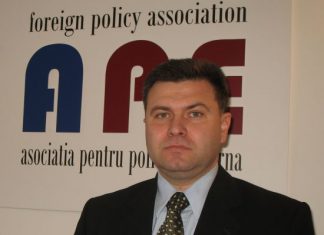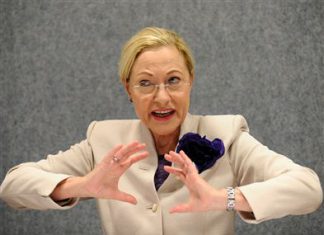Thomas Escritt: Moldova ready to lean toward the west. Financial Times. 14.09.2009.
A ruling by Moldovas constitutional court on Thursday could clear the way for the former Soviet republic to form a western-leaning government after almost six months of political turmoil that began after contested elections in April failed to deliver a clear verdict.
Nicu Popescu: Moldova defies post-Soviet traditions. EUOBSERVER. 10.08.2009.
Obviously every countrys transition from socialism to democracy had its unique set of models and circumstances (and many countries do not even pretent to be in transition”). All transitions are sui generis. At this stage Moldova is strengthening its break from the typically authoritarian post-Soviet governance models, and might be evolving towards the messier style of Central European politics in the 90s. It has no obvious Dzurinda who would accelerate and implement successfully a European reform agenda, and most importantly it does not have an EU accession perspective. Politics will almost inevitably be incredibly messy.
EU’s Eastern Partnership: Additional Possibilities for European Integration of Ukraine. Ukrainian Center for Independent...
This book is an analytical publication which highlights the analysis of a new format of the EU policy in the East (concerning Ukraine, Georgia, Belarus, Azerbaijan, Armenia and Moldova) and views on possibilities of this policy application for further process of the European integration of Ukraine, that is in bilateral dimension și full integration of
Ukraine to the EU structures, and in multilateral dimension și development and en-hancement of regional cooperation between all the Eastern partners and the EU; as well as recommendations for using the Eastern Partnership possibilities.
Victor Chirila: The Republic of Moldova runs the risk of becoming a mission impossible”...
Commentary by Victor Chirila, Executive Director ad-interim of the Foreign Policy Association of Moldova.
Time to solve the Trans-Dniester problem. Louis O’Neill. Kyiv Post. 22.07.2009.
The overload/reset” button was at least somewhat pressed during the Obama-Tandem summit earlier this month, between the American president and the twin rulers of Russia, Dmitry Medvedev and Vladimir Putin.
EU Ministers Discuss Developments In Iran, Israel, Moldova. Ahto Lobjakas, Radio Free Europe, June...
Foreign ministers from the 27 EU member states faced a complex agenda as they met in Luxembourg, staking out cautious positions in response to developments in Iran and Israel. The ministers extended an invitation to Moldova to hold talks on a new cooperation agreement as soon as the EU is satisfied Chisinau is committed to reforms.
Louis O’Neill: Moldova Crisis Is An Opportunity For The EU, Radio Free Europe
The partnership was launched on May 7 in Prague to lackluster reviews as several key European leaders -- most notably Gordon Brown, Nicolas Sarkozy, and Silvio Berlusconi -- failed to show up. Many who did come crossed their fingers that a notorious invitee, Alyaksandr Lukashenka, would stay far away. As it turns out, the Belarusian leader didnt make it and neither did then- (and still-) acting Moldovan President Vladimir Voronin.
Mired in Moldova: “Can Europe’s last Communist government hang on?”, Louis O’Neill. Foreign Policy...
On May 20, the Moldovan opposition passed its first real test of unity when it effectively boycotted the session of the new Parliament -- elected in the controversial polls of April 5 -- that was convened to choose the country's next president. Rapid-fire, there will be another, possibly decisive vote for president, and Vladimir Voronin, the Communist Party head, Parliament speaker, and acting president, called it for May 28.
Creating good neighbours in Russia’s backyard. By Andrew Wilson and Nicu Popescu. The Moscow...
European Union policy toward its neighbours to the east is in trouble, despite the launch of its new Eastern Partnership. European public opinion is increasingly introspective and sporadically protectionist. So what is to be done about the "grey zone" to Europe's east -- the six countries that now lie between the EU and Russia? Inaction is unacceptable. The region has been badly hit by the economic crisis, made all the worse by internal political turmoil and serious security dangers.
Moldova: recession hits a frozen conflict. Louis O’Neill, OpenDemocracy
"With Moldova's horde of guest workers heading home, the effects of global recession will hit Europe's poorest country hard. This crisis could be used to unlock its frozen conflict with Transnistria", comments Louis O'Neill
The World’s Most Unhappy People. Louis ONeill. Wall Street Journal.
The recent government crackdown in Moldova on violent protests against allegations of electoral fraud during the April 5 parliamentary vote brings to mind Eric Weiner's "The Geography of Bliss." The author's year-long search for the world's happiest place led him to the conclusion that Moldovans must be the most unhappy people. Without an "abiding faith or culture on which to rely," Mr. Weiner wrote, Moldovans harbor a superstitious world-view that is "free-floating, anchored to nothing but the cloud of pessimism that hovers over this sad land."
Wake-Up Call for the Kremlin. Louis ONeill. Moscow Times.
For the first time in recent memory, the heavy hitters of international election monitoring -- the Organization for Security and Cooperation in Europe's Office of Democratic Institutions and Human Rights, the Council of Europe and the European Parliament -- were in agreement with Russia-led observers from the Commonwealth of Independent States: Moldovan parliamentary elections on Sunday were run more or less in accordance with accepted norms. Nonetheless, provocateur-instigated violence and vandalism broke out in Chisinau following massive, peaceful and spontaneous opposition protests.
Putting Moldova on the map. Nicu Popescu. The Guardian, 10.04.2009.
The European Union is the only political actor with the credibility to find a solution to the current crisis
When a crowd of demonstrators stormed Moldova's presidential palace and parliament building this week, many in the west struggled to understand what was happening there. Was it a new Ukraine-style "colour revolution", or a Latvia-style riot sparked by the economic crisis? The truth is it's neither.
An EU response to Moldovas Twitter Revolution. Nicu Popescu. EUOBSERVER, 07.04.2009
Moldova is the latest country in Europe to collapse into crisis after a contested election. Some 15.000 people, communicating through web-sites like ‘Twitter, took to the street to protest against unfair elections taking control of the Parliament and Presidential Palace. The protests follow on from Georgias Rose revolution in 2004, Ukraines Orange Revolution in 2005, and the killing of ten protestors against election fraud in Armenia in March 2008.
Moldovan President Suspends Deal With Moscow and Tiraspol. Vladimir Socor. Eurasia Daily Monitor, 31.03.2009
Moldovan President Vladimir Voronin has pulled back at the last moment from the brink of a separate deal to put Russia in the driving seat of negotiations on Transnistria. The March 18 joint declaration by Russian President Dmitry Medvedev, Voronin, and Transnistria leader Igor Smirnov triggered that process. A meeting of Voronin and Smirnov in Tiraspol on March 25 was scheduled as next in the sequence, potentially leading to the presentation of a fait accompli by Moscow to the Western negotiators in the 5+2 format.
Moscow, Tiraspol Sidelining the West From Negotiations on Transnistria Conflict. Vladimir Socor. Eurasia Daily...
The joint declaration by Russian President Dmitry Medvedev, Moldovan President Vladimir Voronin, and Transnistria leader Igor Smirnov, signed in Moscow on March 18 (EDM, March 20, 25, 26), is serving Smirnov well as a negotiation-breaker. Citing points in that declaration, Smirnov is now calling openly for marginalizing or bypassing Western participants in the negotiating process, which Moscow and Tiraspol -or the latter fronting for the former- had already brought to a deadlock.
Moldova’s President Surrendered Long-Held Positions in Joint Declarations with Medvedev. Vladimir Socor. Eurasia Daily...
Moldovan President Vladimir Voronin's signature on the March 18 Moscow declaration, with Russian President Dmitry Medvedev and Transnistria's leader Igor Smirnov (Interfax, Russian MFA website, March 18, 19; see EDM, March 20, 25), amounts to a surrender in the final days of Voronin's presidency. This political document has solidified Russia's military presence and increased Russia's scope for influencing Moldova's policy choices through manipulation of the Transnistria conflict. These are the short-term effects and may extend beyond the short term unless a post-Voronin government disavows this move.
Russia Moving From Conflict-Freezing to Conquest-Guaranteeing in Transnistria. Vladimir Socor. Eurasia Daily Monitor, March...
Russian President Dmitry Medvedev's March 18 meeting with Moldovan President Vladimir Voronin and Transnistria leader Igor Smirnov (see EDM, March 20) was designed to mark a qualitatively new stage in the long-running negotiations on the Transnistria conflict. While continuing to block the conflict resolution negotiations, Russia is trying to move the process toward a formula to guarantee Russian control of this part of Moldova, with troops in place. Moldova's general elections, which are scheduled for April 5, give the Kremlin leverage to pressure Voronin into accepting Russia's terms.
Remarks by Dr. Dr. Hans Martin Sieg, Foreign and Security Advisor, German Bundestag, at...
Since Transnistria broke away, Moldovan governments have tried to reach a settlement, first with Tiraspol and then directly with Moscow, to find a possible path towards conflict resolution. The problem is that neither path proved to be possible.
After the war in Georgia some Western observers wondered whether Russia shouldnt now be willing to send a signal of goodwill and cooperation by resolving the Transnistrian conflict. In fact, the reaction of foreign investors alone showed how economically dependent Russia still is, and that confrontation and isolation damages the trust Russia needs to foster its own development. How isolated Russia has become was demonstrated by the fact that even its closest allies refused to follow its lead in recognizing Abkhazia and South Ossetia.








